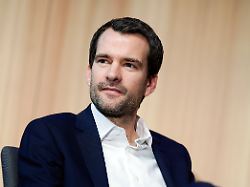Johannes Vogel with Markus Lanz
“I think that was a mistake”
By Marko Schlichting
November 1, 2023, 4:32 a.m
The deputy FDP chairman Johannes Vogel criticizes Germany’s abstention in the vote on a resolution on Israel’s war against Hamas in the UN General Assembly. At Lanz he also advocates tougher action against anti-Semitic crimes.
The parliamentary managing director of the FDP parliamentary group and deputy FDP leader Johannes Vogel criticized Federal Foreign Minister Baerbock’s voting behavior at the UN General Assembly last week. “I think that was a mistake,” says Vogel to Markus Lanz on ZDF. Last week, the federal government abstained from voting on a resolution on Israel’s war against the terrorist organization Hamas. “I am not convinced by the reasons. Hamas’ terror is not clearly named as the cause in the resolution, Israel’s right to self-defense is not emphasized clearly enough, and the release of the hostages is not called for clearly enough. In this case, Germany should have voted against it,” says Vogel. Previously, on his trip to Africa, Chancellor Scholz defended Germany’s voting behavior at the UN General Assembly. Germany has worked hard to reach a decision that does justice to the situation. When that didn’t work, they abstained from voting. The Central Council of Jews and the Israeli ambassador Prosor, however, criticized Germany’s abstention.
“Unleashing inhumanity”
Vogel at Lanz calls the attack on Israel by the Palestinian terrorist organization Hamas on October 7th an “incomprehensible unleashing of inhumanity.” Israel’s existence is threatened. The narrative that Hamas’s actions are part of a liberation struggle is, given the facts, an absolute derailment, Vogel continued.
Tougher action against anti-Semitism
The FDP politician advocates tougher action against anti-Semitic crimes in Germany. The federal government will soon introduce a corresponding bill to the Bundestag. Vogel demands: If someone has been convicted by a court of an anti-Semitic crime, this must be a bar to naturalization. In plain language: A refugee who, for example, makes anti-Semitic comments during a demonstration or burns an Israeli flag should not become German.
At the same time, Vogel demands: “We have to look at where the swamp comes from and where the breeding ground for anti-Semitism is in Germany.” For example, there is not enough talk about the Middle East conflict in schools. “We have to change that,” said Vogel.
“At the same time, we have to ensure that the non-enforceability of measures ends,” says the FDP politician. The state must take action against anti-Semitism from the right, from the left and from the Muslim communities. In an emergency, refugees who behaved in an anti-Semitic manner would have to be deported. “The rule of law must be more decisive here,” said Vogel.
To this end, it is necessary to record personal details at demonstrations where anti-Semitic crimes occur. “That doesn’t happen across the board today,” says Vogel.
The politician also complains that there are still too many imams in Germany who are appointed by the Turkish religious authorities. Just a few days ago, their top boss attracted attention with anti-Israel and anti-Jewish statements. Germany urgently needs to promote the training of imams in its own country. “There are many liberal Muslims, but the imams are not there,” criticizes Vogel.
With its legislative initiative, the traffic light coalition could break open doors at the Union. Last week, CDU leader Friedrich Merz also called for tougher government action against anti-Semitic crimes in the “Frankfurter Allgemeine Zeitung”.
